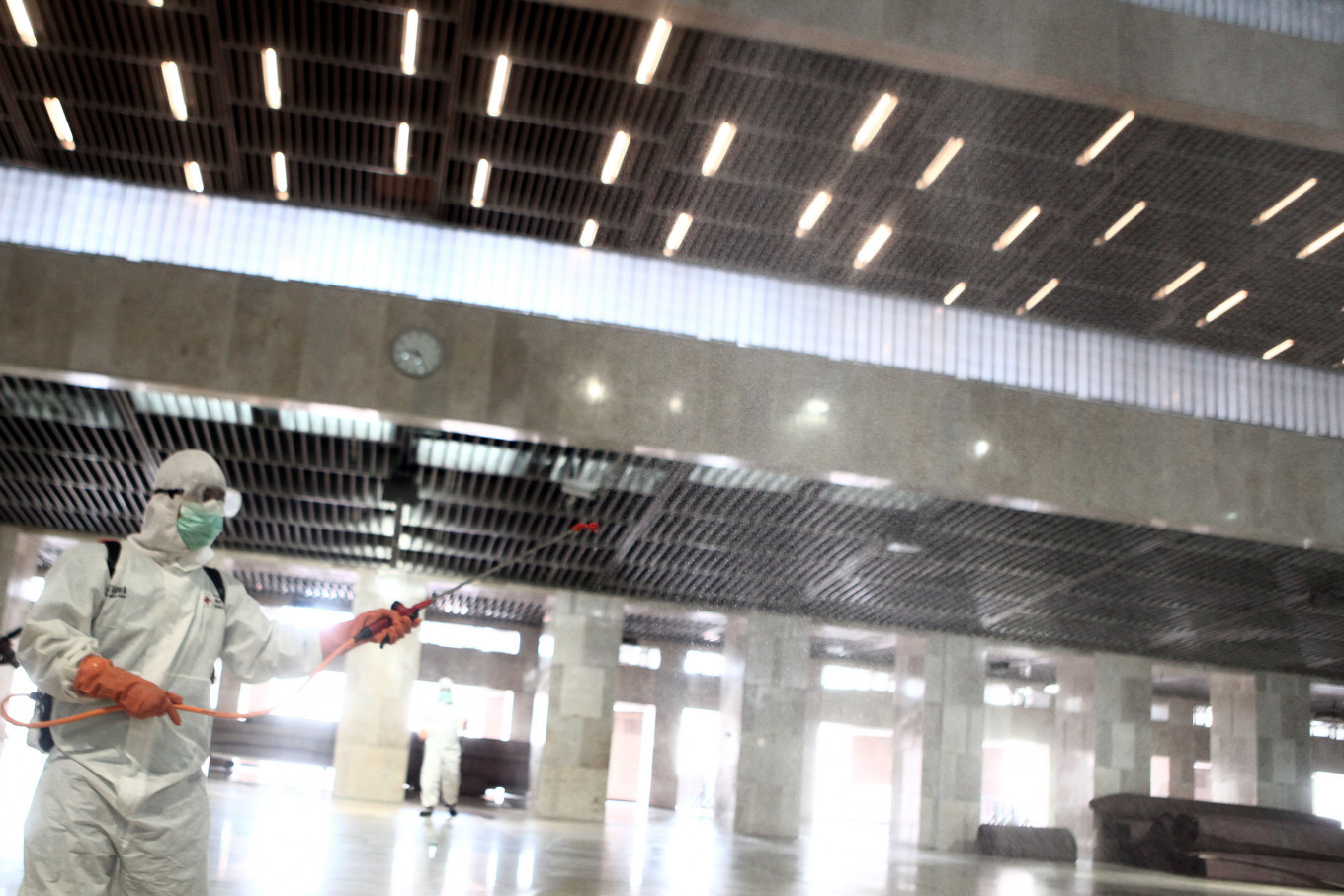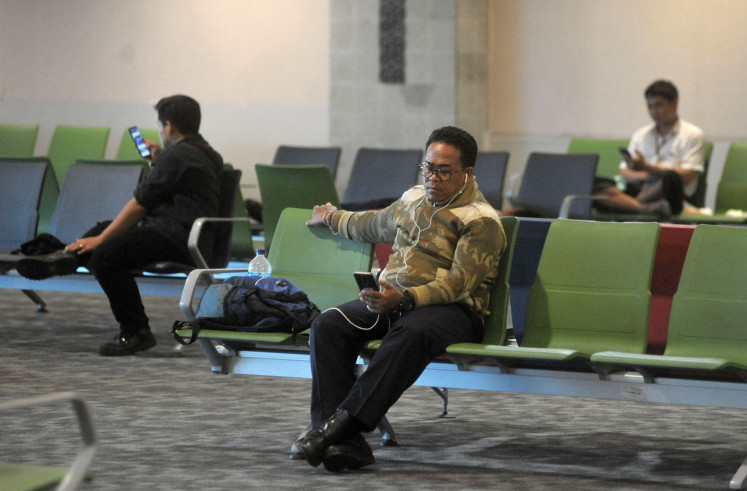Popular Reads
Top Results
Can't find what you're looking for?
View all search resultsPopular Reads
Top Results
Can't find what you're looking for?
View all search resultsCOVID-19 impacts across Indonesia’s business sectors: A recap
The highly infectious pneumonia-like disease has spared only a few businesses, mostly offering healthcare products and services.
Change text size
Gift Premium Articles
to Anyone
I
t is only three months into 2020, but businesses across different sectors in the country have been hit hard as the COVID-19 pandemic wreaks havoc on economic activities nationwide.
The highly infectious pneumonia-like disease has spared only a few businesses, mostly offering healthcare products and services, while many others, from airlines and hotels to retail and food and beverage industries, have taken a hard hit.
The government officially announced the first two confirmed COVID-19 cases at the beginning of March. Several sectors felt the blow in the form of major disruptions in cash flow and business operations as the outbreak spread like wildfire, forcing some employees to work from home, while others became victims of unemployment.
The Jakarta Post has followed recent developments closely and compiled the adverse impacts of COVID-19 on the country’s economy so far.
Travel industry
Popular holiday destinations in Indonesia have grappled with cancellations from hundreds of thousands of tourists, incurring losses worth trillions of rupiah.
The Indonesia Tour Guide Association (HPI) regional head for East Nusa Tenggara (NTT), Agustinus Bataona, said on March 11 that around 45,000 tourists had canceled their plans to visit major destinations in the region from January to May.
Read also: Coronavirus cancellations continue to hit tourism in super-priority Labuan Bajo
The Indonesian Travel Agents Association (Astindo), meanwhile, recorded an almost 90 percent drop in sales due to cancellations as of March 12. The association noted that potential losses in February alone could reach Rp 4 trillion (US$244.96 million) among its members.
These cancellations directly affected the livelihood of tour guides. Agustinus told the Post on March 16 that at least 511 licensed tour guides in NTT had lost their main source of income due to the recent turn of events.
PHRI chairman Hariyadi B. Sukamdani said the total estimated losses calculated from January due to tourists canceling their trips was about $1.5 billion, of which $1.1 billion were from cancellations made by Chinese tourists and $400 million from cancellations by tourists from other countries.
Hotel industry
Hotel occupancy rates have plunged well below the seasonal average across Indonesia, an industry group reported.
PHRI secretary-general Maulana Yusran said the country’s overall occupancy rate had fallen to 30 to 40 percent since the outbreak started in early January, below the regular low season average of 50 to 60 percent, with some hotels dropping as low as 20 percent after Indonesia announced its first cases on March 2.
Read also: Hotel occupancy hit hard by coronavirus
PHRI regional head in Batam Muhammad Mansur told the Post on Friday that between March 23 and March 26, as many as nine hotels in Batam had shut down operations, laying off more than 1,000 workers, as their occupancy rates had plunged to below 5 percent.
Aviation industry
Indonesian airlines have seen a drastic decline in passenger numbers since early March, prompting many to take efficiency measures and laying off their employees.
Indonesia National Air Carrier Association (INACA) chairman Denon Prawiratmadja said on Thursday that all airlines had cut their flights and routes by 50 percent or more because of a drop in passengers.
Passengers sit and wait for flight departure schedule at the Domestic Departure Terminal, I Gusti Ngurah Rai International Airport, Bali on March 18, 2020. (Antara/Fikri Yusuf)State-owned airport operator PT Angkasa Pura I (AP I) reported as many as 12,703 flight cancellations affecting 1.67 million passengers in January and February. Of them, 11,680 were domestic flights and 1,023 were international.
The airport operator suffered financial losses of up to Rp 207 billion due to the cancellations, president director Faik Fahmi said on March 6.
Read also: 12,000 flights canceled over virus fears: AP I
Food and beverages industry
PT Moka Teknologi Indonesia, a homegrown start-up that provides digital cashier services to more than 30,000 merchants in Indonesia, reported that out of the 17 cities it observed, the food and beverage (F&B) industry in 13 experienced a significant decrease in daily earnings.
Internal data from the company showed that Surabaya in East Java and Bali saw the biggest drop, with the F&B industry in Surabaya experiencing a 26 percent fall in daily earnings and Bali 18 percent. They are followed by Greater Jakarta, particularly Depok in West Java, Tangerang in Banten, West Jakarta and East Jakarta.
As a result, major restaurant chains that employ thousands of workers in total have chosen to temporarily shut down operations. Among them are Ismaya Group, which has more than 20 restaurant brands with more than 60 outlets in the country, and the Boga Group, which runs more than 150 restaurants and employs more than 5,000 people.
Retail industry
According to Moka’s internal data, the retail industry in seven cities and municipalities out of the 17 have been affected by the pandemic, with the five most impacted being West Jakarta and Central Jakarta municipalities, South Tangerang in Banten and Depok and Bandung in West Java. The biggest decline in daily earnings was recorded in West Jakarta, which suffered a 32 percent fall in daily earnings per outlet.
The number of visitors to shopping malls has also decreased, prompting several malls to temporarily close their doors but still opening access to tenants serving basic needs, such as supermarkets and drug stores. In Bandung, six shopping malls have partially closed as of Wednesday.
Read also: Jakarta mall tenants object to idea of citywide lockdown
Indonesian Shopping Center Tenant Association (Hippindo) chairman Budihardjo Iduansjah told kompas.com on March 16 that the number of mall visitors had dropped by up to 50 percent following the first announcement of positive COVID-19 cases. That number fell further after the government urged people to stay home in mid-March. (ydp)











